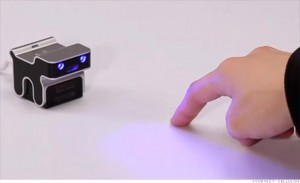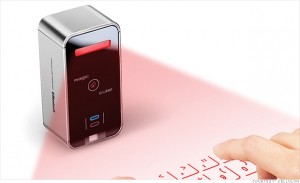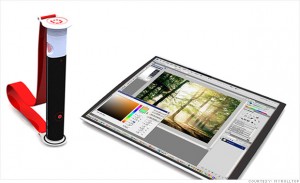Advances in mobile technology are gradually making the desktop PC obsolete. There are some experimental ideas for its future – and, eventually, its replacement.
 1. The optical mouse eventually replaced the roller-ball, but the desktop mouse has remained essentially unchanged for more than 30 years. A few crafty companies, though, are rethinking how we interact with machines. Enter the evoMouse from South Korean firm Celluon. Touted by Celluon as the “evolution of the mouse,” the evoMouse is a digital mouse that turns your finger into the pointer, using sensors to track your movements. Set the gizmo on any flat surface and start gesturing in front of it. You can tap to “click,” “right-click” using two fingers and drag and scroll with gestures. The evoMouse can connect to almost any PC or laptop using Bluetooth or a USB connector. The mouse should launch in the U.S. in mid-2013, according to Celluon spokesman Chris Chon.
1. The optical mouse eventually replaced the roller-ball, but the desktop mouse has remained essentially unchanged for more than 30 years. A few crafty companies, though, are rethinking how we interact with machines. Enter the evoMouse from South Korean firm Celluon. Touted by Celluon as the “evolution of the mouse,” the evoMouse is a digital mouse that turns your finger into the pointer, using sensors to track your movements. Set the gizmo on any flat surface and start gesturing in front of it. You can tap to “click,” “right-click” using two fingers and drag and scroll with gestures. The evoMouse can connect to almost any PC or laptop using Bluetooth or a USB connector. The mouse should launch in the U.S. in mid-2013, according to Celluon spokesman Chris Chon.
2. The keyboard that isn’t there- Typing on cramped touchscreens is now an everyday practice, but it’s still awkward. Celluon’s Magic Cube aims to be a virtual keyboard you can link up to your smartphone or tablet for a full-size typing option. Celluon sells the Magic Cube on its website right now for $170, but it says a new version — half the current size and priced at $130 — will be unveiled in January at the Consumer Electronics Show.
practice, but it’s still awkward. Celluon’s Magic Cube aims to be a virtual keyboard you can link up to your smartphone or tablet for a full-size typing option. Celluon sells the Magic Cube on its website right now for $170, but it says a new version — half the current size and priced at $130 — will be unveiled in January at the Consumer Electronics Show.
 3. Imagine rolling your computer up like a blueprint and carrying it yoga-mat-style. Meet the Rolltop, a laptop made out of a flexible display touchscreen that’s are designed to be folded up, rolled around a cylindrical tube and carried over the shoulder. You can use it bent in half like a laptop, with a virtual keyboard appearing on the lower half, or you can flatten it like a giant tablet, writing on it with a built-in pen. Since there’s no actual prototype yet, it’s impossible to speculate on when it would be available, or how much it could cost. The Rolltop is “buzzware”: Its creators, the German design firm Orkin Design, built a splashy website to tout the concept and are looking for partners to make it a mass-market reality.
3. Imagine rolling your computer up like a blueprint and carrying it yoga-mat-style. Meet the Rolltop, a laptop made out of a flexible display touchscreen that’s are designed to be folded up, rolled around a cylindrical tube and carried over the shoulder. You can use it bent in half like a laptop, with a virtual keyboard appearing on the lower half, or you can flatten it like a giant tablet, writing on it with a built-in pen. Since there’s no actual prototype yet, it’s impossible to speculate on when it would be available, or how much it could cost. The Rolltop is “buzzware”: Its creators, the German design firm Orkin Design, built a splashy website to tout the concept and are looking for partners to make it a mass-market reality.
4. Your home is the computer- Part Siri, part Starship Enterprise, the Ubi, or ubiquitous computer, promises to bring the power of the Internet into any room in your house. Plugged in, the Ubi sits and waits for you to say its name and then give it a command or ask a question. It can also monitor the room it’s in and send you alerts if something changes. It can text you if the lights go on in your bedroom, for example, or let you know that it’s only 46 degrees inside and you might want to turn the heat on. Ubi engineers Leor Grebler, Amin Abdossalami and Mahyar Fotoohi raised nearly $230,000 on Kickstarter to create the Ubi, which is slated to start shipping in early 2013. Retail versions, priced at $220 each, are scheduled for an April release.


